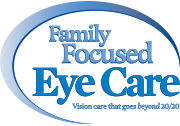When Should You Schedule an Eye Appointment?
Vision problems can occur at any age, which is why regular eye exams are so important. And vision care isn’t just about seeing well. It’s also about quality of life. Good vision care leads to better overall health.
Infants
Dr. Hulet encourages parents to include a trip to the optometrist on the list of well-baby check-ups. He performs these comprehensive visits at no charge. Assessments at six to twelve months of age can determine healthy development of vision. Early detection of eye conditions is the best way to ensure a baby has healthy vision for successful development—now and in the future. Again, it is free with Dr. Hulet, so bring your baby in!
Kids
For kids, regular eye exams are important because 80% of what a child learns by age 12 is obtained visually. Yet seven out of ten school-age children that have problems reading struggle because of some form of visual impairment. If your child is struggling in school, bring them in for a kid-friendly eye exam.
Teens
There is a significant relationship between undetected vision problems and reading and learning difficulties. Problems in school affect not just learning, but also a young person’s self image, and that can translate to problems throughout life. Especially in this developmental stage of life, if it important to make sure your teens are receiving appropriate eye care.
Adults Ages 18-39
At this stage, there is a trend toward heavy contact lens use. Remember, in most cases, contact lens wearers should allow four to six hours of rest for their eyes to get the oxygen they require each day. Always have a good pair of glasses for times you’re not wearing your contacts.
Adults Over 40+
Once you hit 40, your vision begins to change. Even if you never needed glasses before, you’ll soon need some sort of vision correction to help you read.
Seniors
One in every three seniors has a vision-impairing eye disease, but most aren’t aware of any symptoms until the eye disease has progressed to the point that treatment options are limited. Regular eye exams can detect them much earlier and give you many more years of good eyesight.
No matter what a person’s age, eye exams do more than determine eye health. In fact, diseases like diabetes and hypertension can be detected during an exam. The bottom line? Good vision can last a lifetime. But, in order to protect your eyes, prevention and care should start at a young age.
Family Focused Eyecare is dedicated to helping you see better, live better, and maintain healthy vision for a lifetime.
